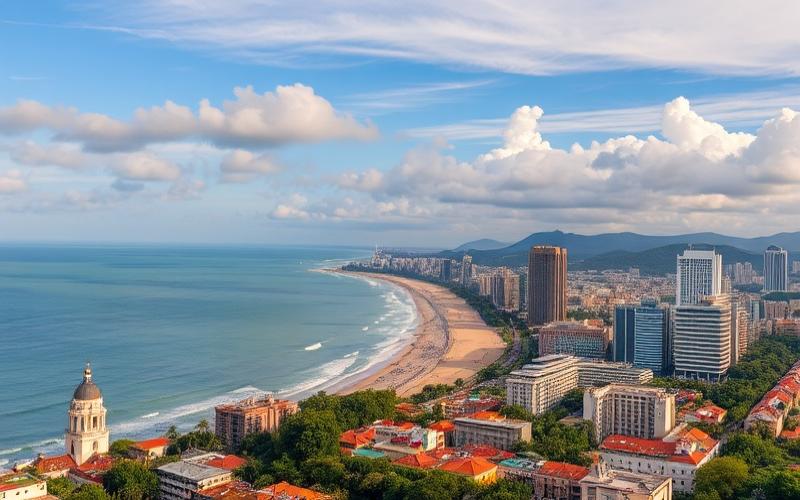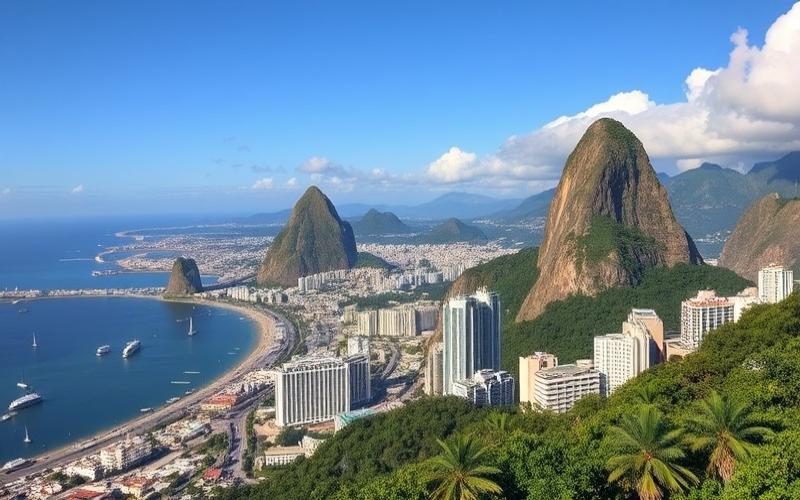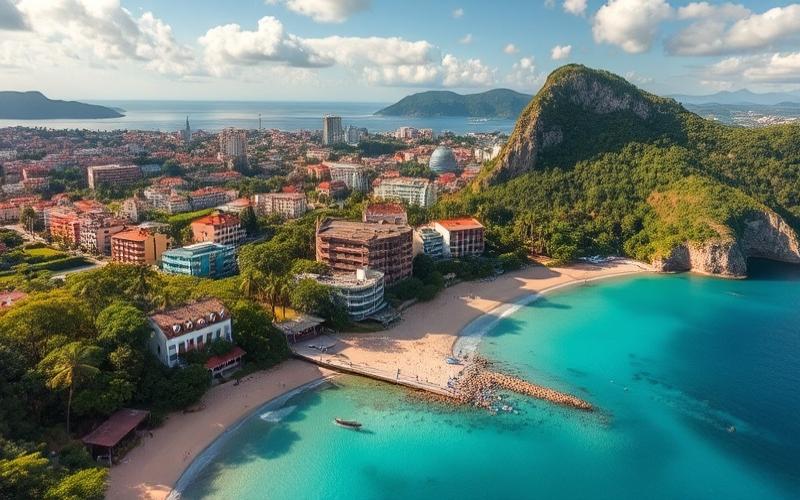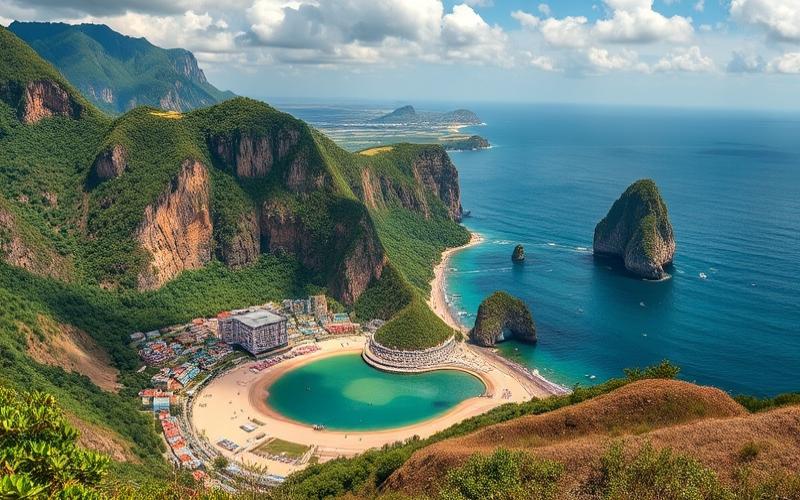
 Published on and written by Cyril Jarnias
Published on and written by Cyril Jarnias
Investing in real estate abroad is an appealing opportunity for expatriates seeking to diversify their portfolio, and Brazil stands out as a prime destination. With its dynamic real estate market and steady economic growth, this South American country offers unique advantages for savvy investors.
The cultural richness, combined with exceptional biodiversity, makes Brazil not only an attractive investment location but also a fascinating place to live.
This article will guide you through the essentials you need to know to effectively invest in the Brazilian real estate market, taking into account tax implications, regional specificities, and specific opportunities that can maximize your returns.
Legal Considerations for Property Purchase by Expatriates in Brazil
Land Ownership Law for Foreigners in Brazil:
- Foreigners can freely purchase real estate in urban areas.
- Restrictions apply to rural lands: purchasing large agricultural areas (more than 50 fiscal modules, variable by region) requires government authorization.
- Acquisition of properties in border areas (150 km from the border) requires approval from the National Defense Council.
- Certain restrictions exist for properties in coastal zones.
- Once the purchase is completed, foreigners have the same property rights as Brazilians.
Legal Documents Required for Property Purchase by an Expatriate:
- Valid passport or ID card.
- CPF (Cadastro de Pessoas Físicas, Brazilian tax identification number).
- Proof of address.
- Proof of funds source for the purchase.
- Deed of sale (Escritura Pública de Compra e Venda).
- Negative certificates of debts and mortgages related to the property.
Role of Notaries and Lawyers:
The notary (Tabelião) authenticates and registers the deed of sale, verifies the identity of the parties and the regularity of documents.
The specialized lawyer assists the buyer in verifying the legal validity of the transaction, compliance of property titles, and drafting contracts.
The presence of a lawyer is not mandatory, but it is highly recommended to secure the operation.
Taxes and Fees Associated with Property Purchase:
| Tax/Fee | Description | Estimated Amount |
|---|---|---|
| ITBI | Imposto de Transmissão de Bens Imóveis (property transfer tax) | 2 to 4% of purchase price |
| Notary fees | Fees for authentication and registration of the deed | 1 to 2% of purchase price |
| Lawyer fees | Legal counsel and case monitoring | Variable (generally 1 to 2% of purchase price) |
| Property registration | Registration of the property with the real estate registry | Approximately 0.5% of purchase price |
Precautions to Avoid Real Estate Fraud:
- Verify the authenticity of the property title with the Cartório de Registro de Imóveis (local property registry).
- Request negative certificates of debts, mortgages, and disputes.
- Ensure the seller is the legitimate owner and the property is free of any encumbrances.
- Use an escrow account for payment until transaction completion.
- Always prioritize transactions with the support of a specialized lawyer.
- Obtain a CPF (essential for any real estate transaction).
- Have foreign documents translated and legalized if necessary.
- Expect longer administrative delays than in Europe.
- Never sign documents without full understanding; request translation if needed.
- Be wary of overly attractive offers or pushy sellers.
- Prefer accredited professionals (notaries, lawyers, real estate agents).
- Keep written records of all communications and transactions.
Support from a local specialized lawyer and rigorous document verification are the best guarantees to secure a real estate purchase in Brazil as an expatriate.
Good to Know:
Foreigners can purchase real estate in Brazil, but restrictions exist for rural and coastal areas; it is essential to consult a local lawyer to draft the purchase contract and a notary for registration, while meticulously verifying property titles to avoid fraud. Remember to prepare to pay the ITBI, a specific tax that varies by city, in addition to understanding necessary documents like the CPF (Cadastro de Pessoas Físicas) to complete the purchase.
Administrative Procedures Necessary for Real Estate Investment
Visa and Residency Procedures for Investing in Brazil
- Investor Visa (VITEM IX): Requires a minimum investment of 500,000 BRL (~86,000 USD) in a company or real estate. The required amount for real estate may vary by region.
- Golden Visa/VIPER Program: Allows permanent residency through real estate investment, generally starting from R$ 1,000,000 or more than €250,000 depending on terms. This visa paves the way for citizenship and does not impose strict limits on stay or number of entries.
Steps to Obtain a Brazilian Tax ID (CPF)
- Fill out the online form on the official Receita Federal website.
- Present yourself at a local tax office, partner bank agency, or post office with passport and proof of address.
- Pay administrative fees (modest).
- Receive your CPF number essential for all real estate procedures.
The CPF is also necessary to open a Brazilian bank account and perform any notarial transaction.
Procedures to Open a Brazilian Bank Account
- Provide:
- Valid passport
- Appropriate Brazilian visa
- Proof of local address
- CPF number
- Recent bank statements
- Present these documents in person at a bank branch.
- Foreign documents must be translated into Portuguese by a sworn translator; some require legalization or apostille.
Local Regulations Regarding Property Purchase by Foreigners
| Property Type | Main Restrictions |
|---|---|
| Full urban ownership | Free purchase, usage, rental, resale possible |
| Rural property/border zone | Partial restriction or even prohibition |
| Military/special protection zone | Acquisition impossible without specific authorization |
Restrictions mainly concern agricultural lands near national borders and certain strategic areas.
Mandatory Documents Required When Purchasing a Property
- Valid passport & CPF of the buyer(s)
- Preliminary contract/purchase promise (Contrato de Promessa)
- Property registry certificate (Matrícula do Imóvel) proving property legality
- Negative certificates proving absence of mortgage/debt/dispute (Certidões negativas)
- Local tax certificate (Certificado do IPTU)
- Recent official property appraisal
All documents must be officially translated if written in a foreign language.
Role of Notaries and Specialized Lawyers
The notary (Cartório) formalizes the authentic deed before witnesses, verifies the legal compliance of the file, and proceeds with its public registration.
Specialized Lawyer:
- Controls all legal risks
- Ensures the seller is the legitimate owner
- Verifies absence of mortgages/disputes
- Supervises each step until effective transfer
The simultaneous presence of the notary AND a lawyer guarantees maximum legal security during real estate acquisitions.
Administrative Fees & Taxes Associated with Property Purchase in Brazil
| Type | Approximate Amount |
|---|---|
| Notary fees | ~1–2% of total price |
| ITBI (municipal tax) | ~2–4% depending on municipality |
| Bank/transaction fees | Variable |
Additional fees may apply: sworn translation, legalization/apostille of foreign documents.
Legal/Administrative Deadlines to Expect Before Finalization
- CPF acquisition: a few business days if physically present in Brazil; several weeks from abroad.
Bank account opening: variable – between a few days and two weeks depending on bank
Notary analysis/legal file preparation: about two weeks
Municipality processing/final registration at property registry after ITBI payment: generally within thirty days
In total, expect between four weeks minimum (complete file) up to two months or more if specific complexities – particularly with official translations or particular local requirements.
To Succeed in Your Real Estate Project in Brazil as an Expatriate Investor:
- Meticulously prepare all translated/sworn documents
- Systematically surround yourself with a specialized lawyer AND regularly consult the competent local notary
- Anticipate additional fees/local taxes from the initial budget phase
Good to Know:
To invest in Brazil, expatriates must obtain an appropriate residence visa, such as the investor visa, and a CPF, essential for any real estate transaction; it is also crucial to open a local bank account to manage finances. Ensure you check restrictions on foreign purchase of agricultural lands and prepare for fees such as the ITBI, with the help of a notary to guarantee a transaction compliant with legislation.
Financial Implications and Investment Strategies for Expatriates
Tax Implications for Expatriates Investing in Brazilian Real Estate
Local Taxes to Expect:
- ITBI (Property Transfer Tax): 2 to 4% of purchase value, variable by municipality.
- IPTU (Urban Property Tax): annual tax depending on location and property value.
- Tax on rental income: flat rate of 15% for non-residents on net rental income.
- Capital gains tax: 15% upon property resale for non-residents.
International Tax Treaties
Brazil has signed tax treaties with many countries to avoid double taxation. It is essential to verify the treaty between Brazil and the expatriate’s home country to optimize overall taxation.
Taxation on Rental Income and Capital Gains
Rental income received by a non-resident is subject to a fixed rate of 15%. It is possible to deduct certain expenses (maintenance, management, property taxes) to reduce the taxable base.
| Income Type | Non-Resident Tax Rate | Possible Deductions |
|---|---|---|
| Rental income | 15% | Expenses, maintenance, taxes |
| Capital gains upon resale | 15% | Not specified |
For short-term rentals (“flat service” regime), a reduced taxation of 5% on gross revenue may apply if the property is operated as seasonal rental.
Currency Fluctuations and Impact on Investment
- The Brazilian real (BRL) is a volatile currency against the euro and dollar.
- A depreciation of the real can increase rental profitability in foreign currency but reduce resale value upon conversion.
- Exchange rate variations therefore directly impact net profitability and asset valuation.
Investment Strategies Adapted for Expatriates
Choice of Promising Sectors:
- High-end residential real estate in major cities (São Paulo, Rio de Janeiro).
- Tourist sectors (Northeast, coastline) for seasonal rental.
- Social or urban housing programs, sometimes benefiting from tax incentives.
Profitability Perspectives:
- Short term: seasonal or furnished rental, high gross profitability but increased volatility.
- Long term: progressive property appreciation, protection against local inflation, asset stability.
Portfolio Diversification:
- Distribute investments among several property types (residential, commercial, tourist).
- Invest in different regions to limit risk linked to a single economic zone.
Collaboration with Local Experts
It is essential to work with:
- Specialized lawyers for property title verification, contract compliance, and tax formality management.
- Brazilian notaries for deed signing and transaction registration.
- Local accountants to optimize tax declaration and benefit from authorized deductions.
Financing the Acquisition
- Possibility of financing through Brazilian banks, but credit access may be restricted for non-residents.
- Some foreign financial institutions offer international credit solutions, often with stricter conditions.
- It is possible to use structures with asset-holding companies (SCI, holdings) to facilitate financing and tax management.
Practical Tips
- Always verify tax treaties between Brazil and your home country.
- Closely monitor BRL/foreign currency exchange rate evolution.
- Prioritize investments in sectors or regions benefiting from tax incentives or high rental demand.
- Surround yourself with local professionals (lawyer, notary, accountant) from the prospecting phase through property management.
Key Takeaway
Expatriates must anticipate local taxation, currency risks, and rely on experts to secure their real estate investment in Brazil.
Good to Know:
Check if a tax treaty exists between Brazil and your home country to avoid double taxation and prioritize investment in emerging real estate sectors to maximize your returns; collaborate with local experts to understand regulations and explore financing options with Brazilian banks.
Disclaimer: The information provided on this website is for informational purposes only and does not constitute financial, legal, or professional advice. We encourage you to consult qualified experts before making any investment, real estate, or expatriation decisions. Although we strive to maintain up-to-date and accurate information, we do not guarantee the completeness, accuracy, or timeliness of the proposed content. As investment and expatriation involve risks, we disclaim any liability for potential losses or damages arising from the use of this site. Your use of this site confirms your acceptance of these terms and your understanding of the associated risks.


























































